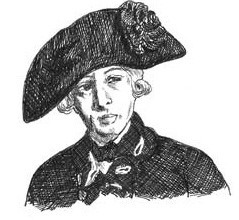Governor Phillip Visited Students!

by Sarah Jane Ash – Head Teacher at Springbrook State School, Queensland & Dr Charles J Margerison, Psychologist
June 2013
What was it like to be a convict, in 1788, when the First Fleet arrived in Australia?
That was one of the questions asked, by our 8 to 10-year-old students, when Governor Phillip came to visit Springbrook State School.
Dr Charles Margerison, psychologist, helped students travel through time. He played the role of Governor Phillip and brought with him a Military Man, representing the marines who guarded the convicts. Also, a Government Man was there to establish law and order. Three of our teachers played the roles of convicts.
It proved to be a learning experience for everyone. Our students had the chance to see a short avatar video, where Governor Phillip ‘himself’ showed pictures of the 252 day voyage from England.
After that, the students met in groups to develop questions.
- Why were convicts sent to New South Wales?
- What was the journey like?
- Where did people live when they arrived?
- What food was available?
Governor Phillip, and his team, recreated the situation for the students. A fascinating discussion took place on how people lived on the 11 ships and also in tents, after they arrived.
Then, the students were invited to watch a short avatar video of Susannah Holmes, a convict on the First Fleet. On arrival in Australia, she married Henry Cable and told him of some money that was collected for her baby, before she left England. En route, this was stolen by one of the sailors, Captain Sinclair.
As a result of a petition from Cable, the first Court Case in New South Wales was held. Susannah Holmes, role-played on our day at Springbrook by Gwyn Beasley, won the case and was awarded 15 pounds, quite a feat for a convict! It is said that this is where the term ‘fair go’ originated. Susannah became the richest woman in the country.
The students asked Susannah many questions. Her answers about the money surprised them. Susannah said that she could not spend the money, as there were no shops at the time. However, her husband used the funds, when his convict sentence was completed, to buy land and boats. As a result, the Cable family and their 11 children became the richest convict family in the new colony. If they had stayed in England, it is unlikely they would have done so well.
Later, the students imagined they were either convicts, or part of the Governor’s team. They were asked to write a letter to be sent to their family in England. However, as only some of the people could read and write at the time, the students had to dictate their letters, to other students, to create the conditions of the time.
 We then discussed what it was like for the Aboriginal tribes. The students asked questions about the way Governor Phillip tried to learn their language, by capturing Arabanoo, Bennelong and Colbee.
We then discussed what it was like for the Aboriginal tribes. The students asked questions about the way Governor Phillip tried to learn their language, by capturing Arabanoo, Bennelong and Colbee.
So it was that we flew through time. We created an experience of what it was like for the people of the First Fleet and the members of the Aboriginal tribes, in and around Sydney.
 It is part of an approach, called Learning from Amazing People, where students can meet amazing people from history, including: William Shakespeare, Marie Curie, Mozart and others, who achieved a great deal in their lives. They provide role models for students of those who used their time well. In that way, amazing people demonstrate what is possible and can inspire students to do likewise. This fosters the development of good characteristics.
It is part of an approach, called Learning from Amazing People, where students can meet amazing people from history, including: William Shakespeare, Marie Curie, Mozart and others, who achieved a great deal in their lives. They provide role models for students of those who used their time well. In that way, amazing people demonstrate what is possible and can inspire students to do likewise. This fosters the development of good characteristics.
 Dr Charles Margerison, founder of Amazing People Worldwide and Amazing People Schools, is a Psychologist. As well as working in educational organisations for many years, he has consulted widely for major corporates in the fields of organizational and educational psychology. He was previously Professor of Management at Cranfield University, UK, and the University of Queensland, Australia. He founded Amazing People Worldwide in 2006 and is supported by a dedicated global team. Dr Margerison is a member of the Royal Institution, Royal Society of Literature, Historical Association, and Association of Business Psychology. He previously co-founded Emerald Publishing Ltd, and Team Management Systems, a team-building tool, which is now used in 190 countries worldwide.
Dr Charles Margerison, founder of Amazing People Worldwide and Amazing People Schools, is a Psychologist. As well as working in educational organisations for many years, he has consulted widely for major corporates in the fields of organizational and educational psychology. He was previously Professor of Management at Cranfield University, UK, and the University of Queensland, Australia. He founded Amazing People Worldwide in 2006 and is supported by a dedicated global team. Dr Margerison is a member of the Royal Institution, Royal Society of Literature, Historical Association, and Association of Business Psychology. He previously co-founded Emerald Publishing Ltd, and Team Management Systems, a team-building tool, which is now used in 190 countries worldwide.
